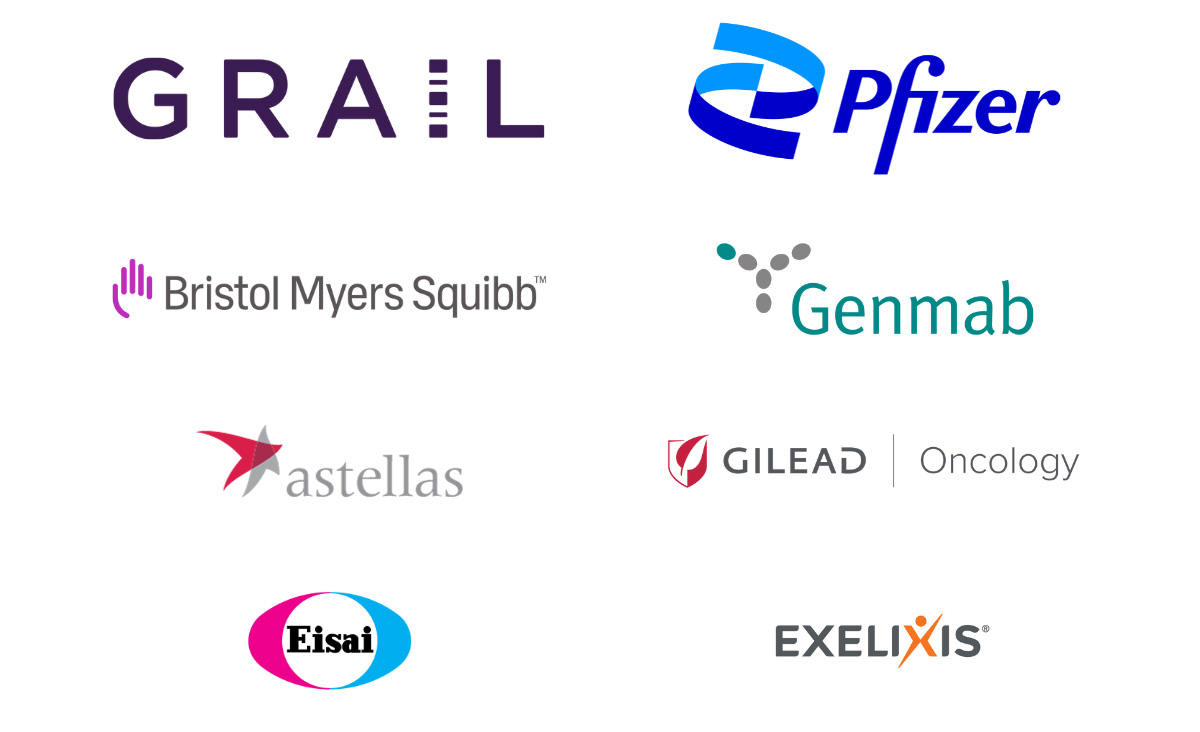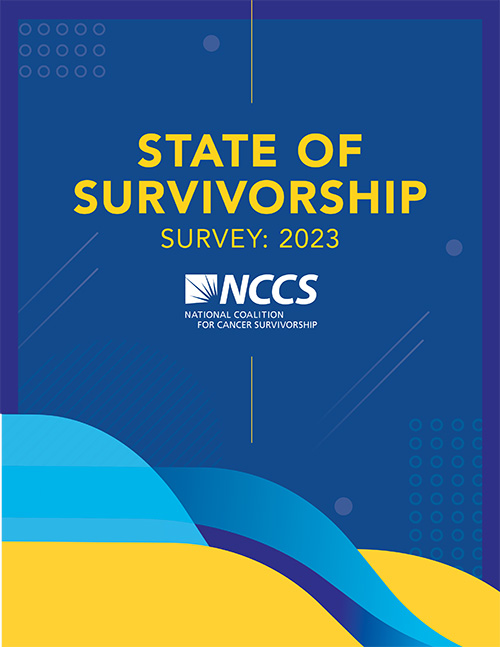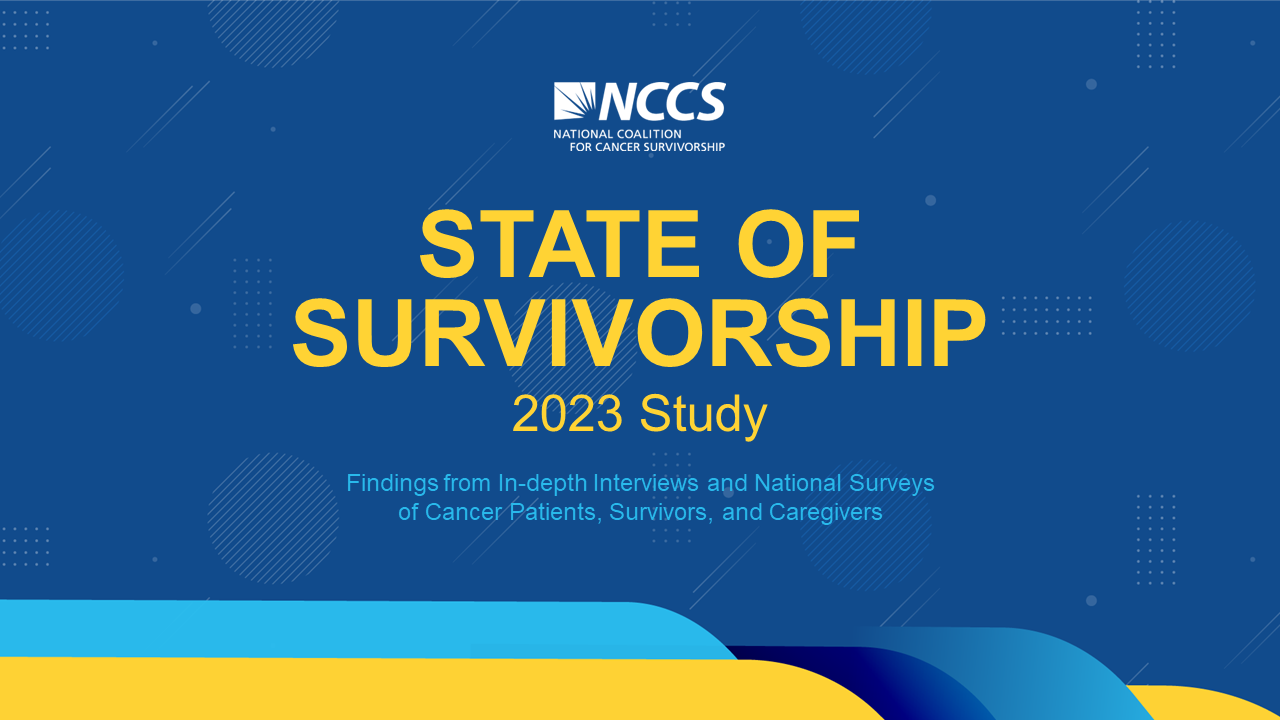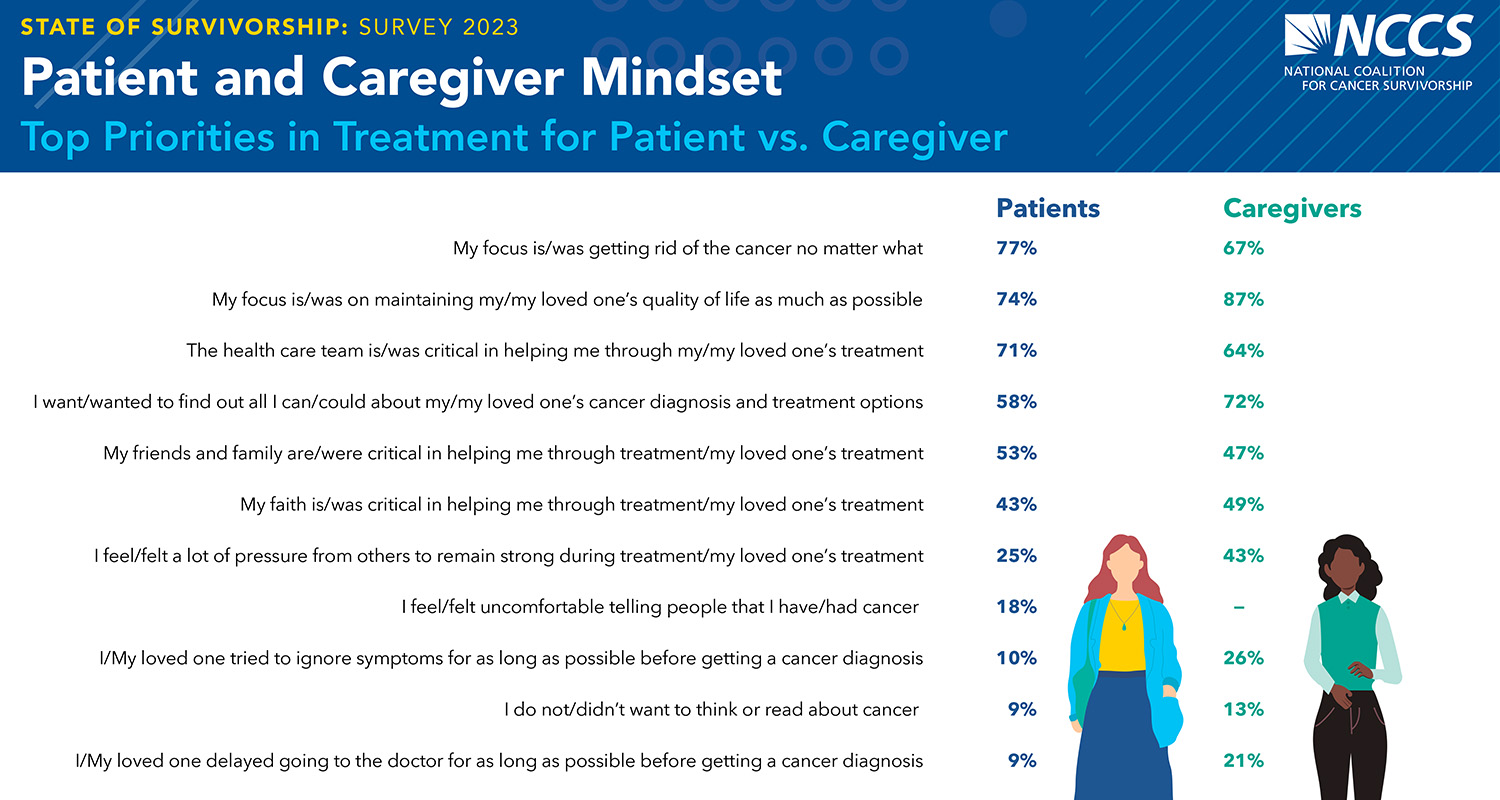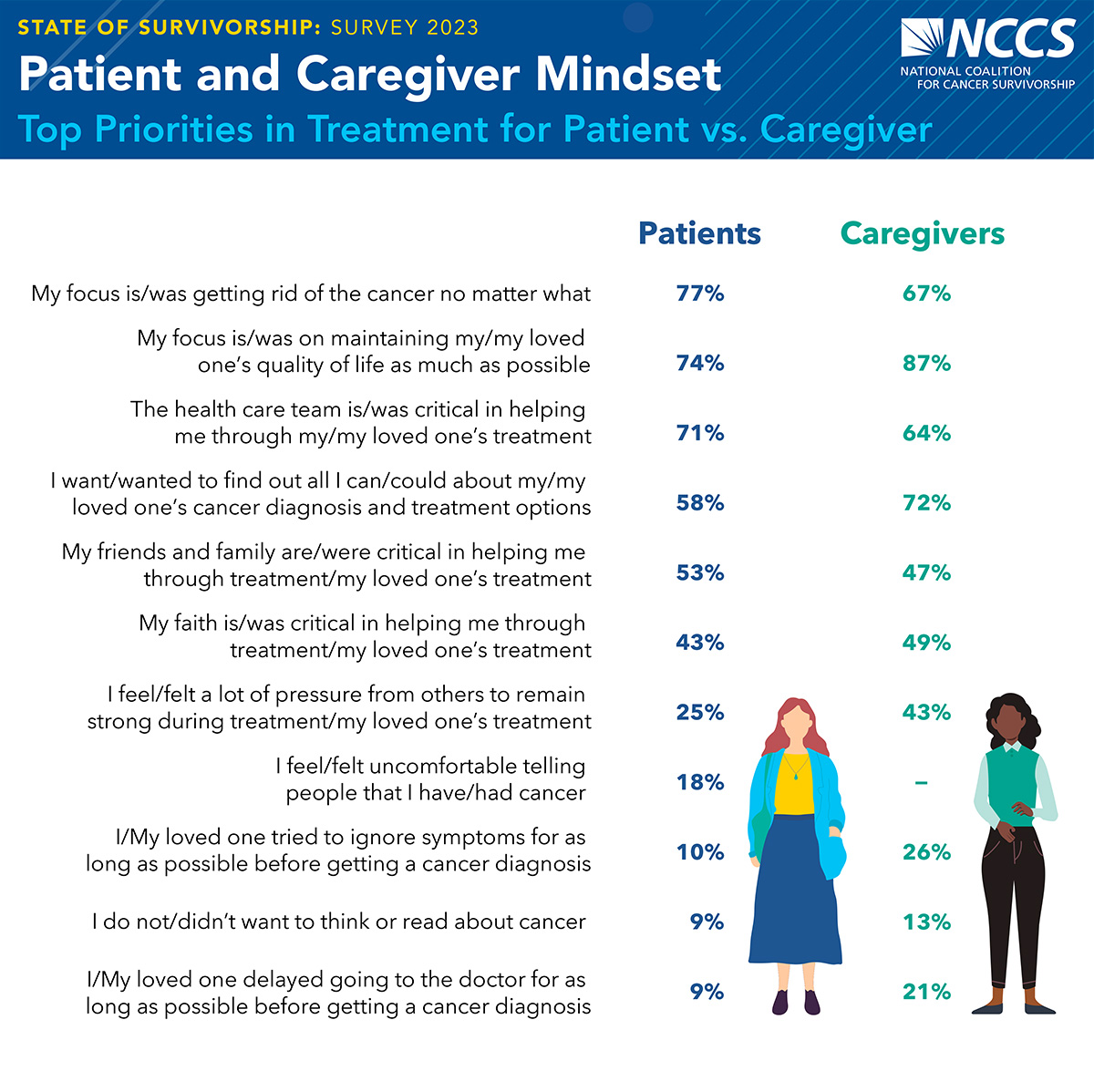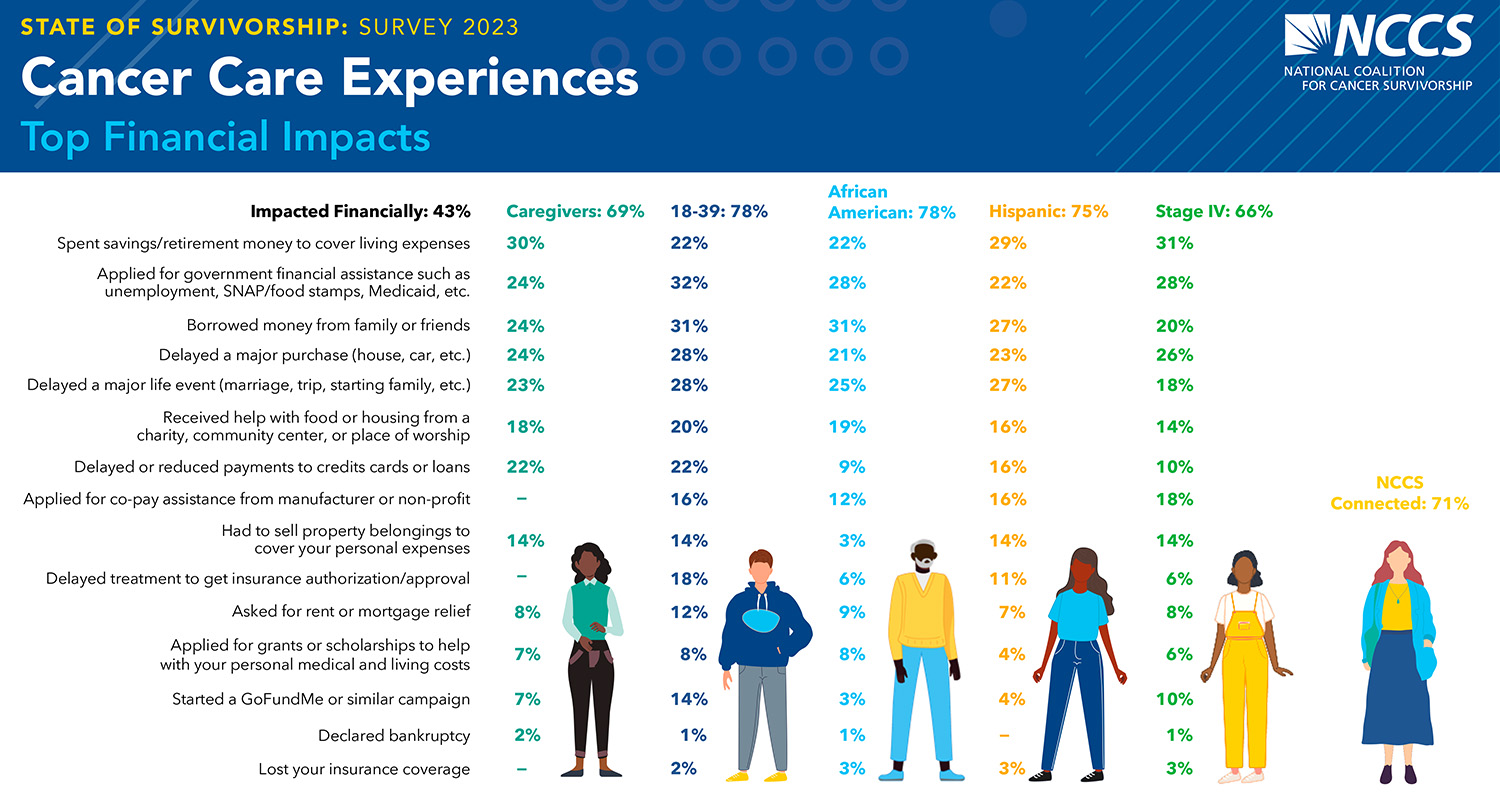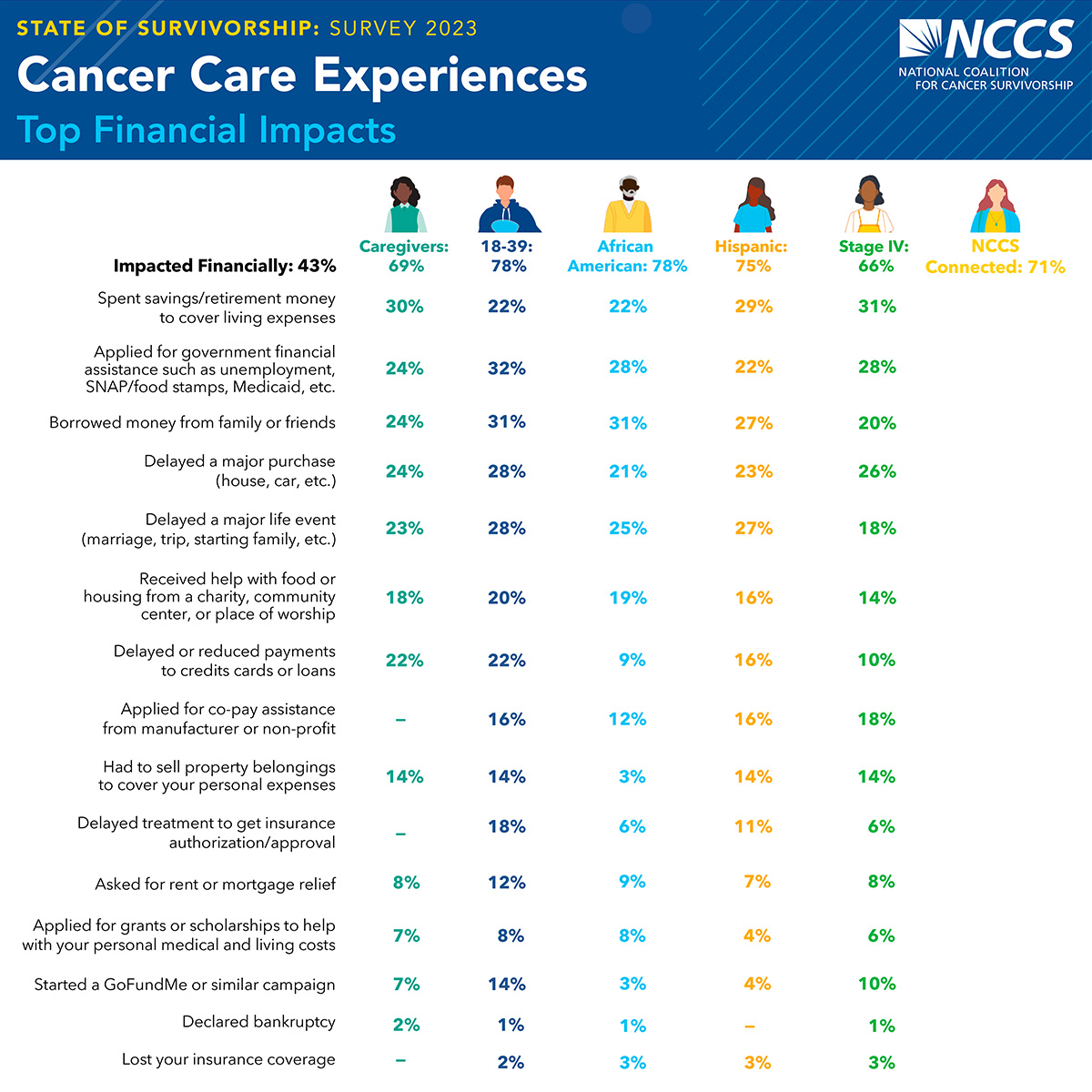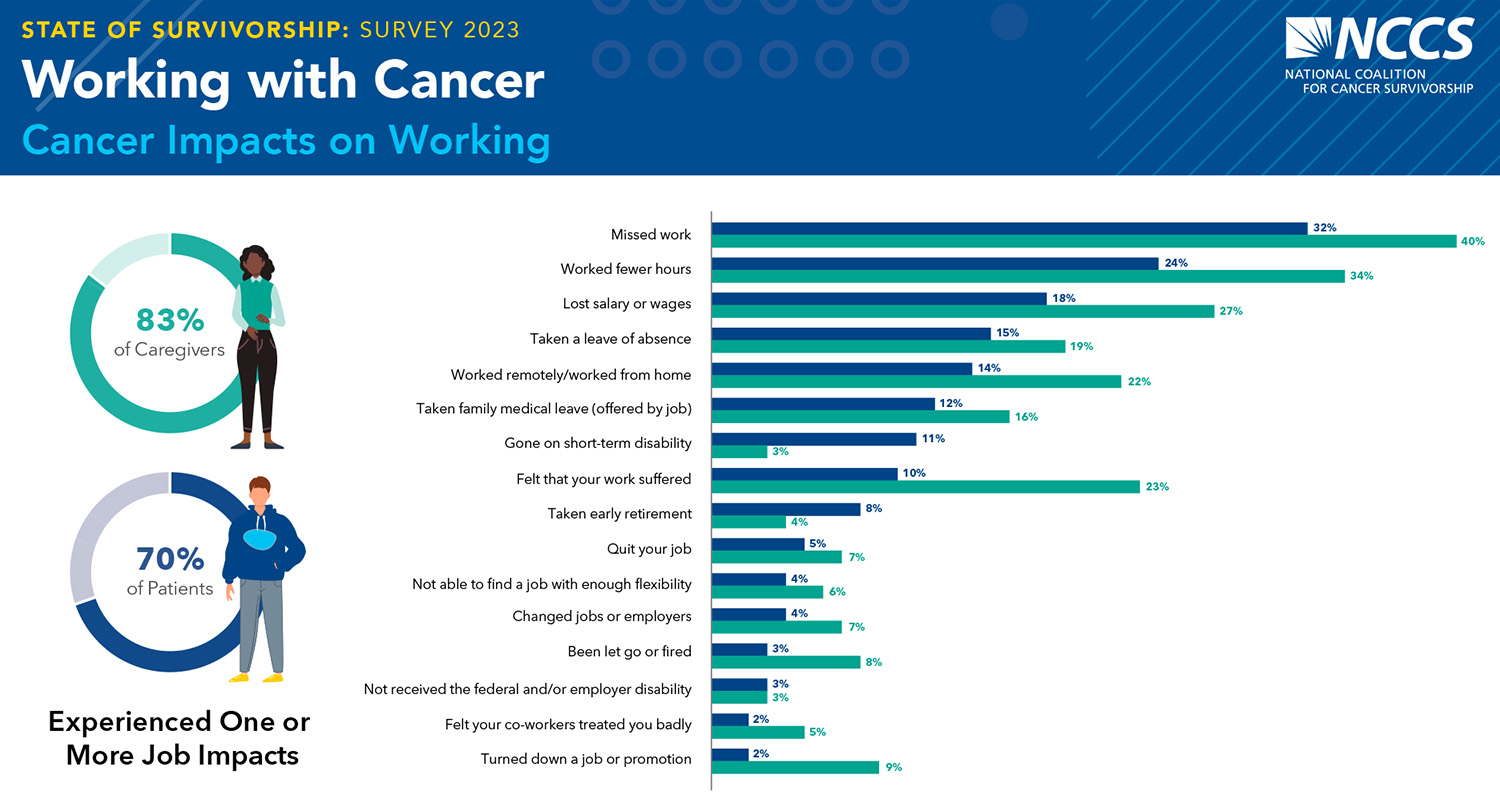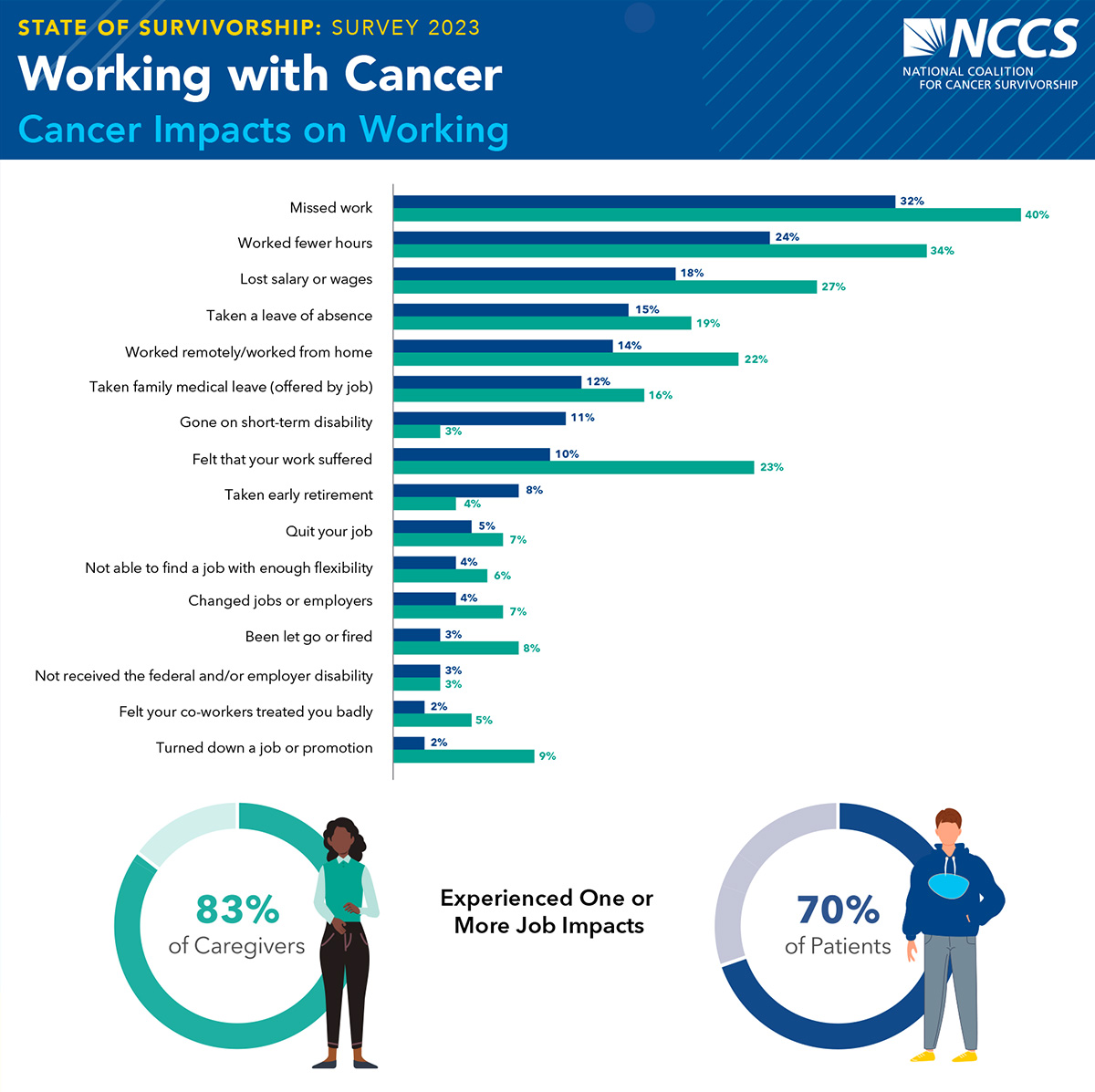Introduction
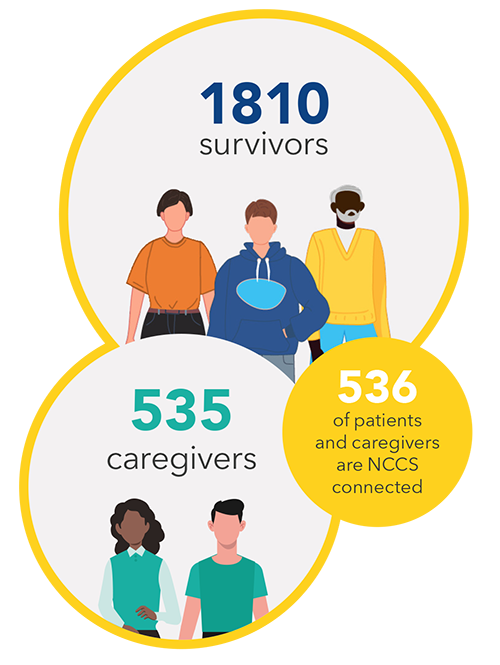 The National Coalition for Cancer Survivorship (NCCS) conducts an annual State of Survivorship Survey, in partnership with Edge Research, to explore the cancer survivor journey. This study captures a range of perspectives to better understand how NCCS can support its mission to advocate for quality cancer care for everyone touched by cancer.
The National Coalition for Cancer Survivorship (NCCS) conducts an annual State of Survivorship Survey, in partnership with Edge Research, to explore the cancer survivor journey. This study captures a range of perspectives to better understand how NCCS can support its mission to advocate for quality cancer care for everyone touched by cancer.
The 2023 State of Cancer Survivorship Survey was conducted February through June of 2023 and builds upon findings from previous years to help NCCS understand the differences in survivor attitudes, experiences, and needs. This year’s survey also includes new questions to determine how caregivers align with and differ from patients regarding decision-making and satisfaction with cancer care. Additionally, the survey includes new questions about survivor and caregiver employment challenges after a cancer diagnosis.
Fifteen in-depth interviews and a nationwide survey of 2,345 survivors and caregivers were conducted, 536 of whom have a connection to NCCS. Survey respondents in the national sample represent a wide range of cancer types, stages of diagnosis, demographics, and socioeconomic levels, and NCCS used a sampling plan to ensure the survey was representative of cancer survivors and caregivers nationally by age, gender, race/ethnicity, and region (based on data from the American Cancer Society and National Cancer Institute). All data presented are from the national sample (n=1303 patients and n=506 caregivers) unless otherwise noted.
Download The Report
Web Briefing
On October 3, NCCS hosted a web briefing to present the 2023 survey findings. Pam Loeb, Principal of Edge Research, and NCCS CEO Shelley Fuld Nasso discussed the results in detail and took questions from an audience of survivors, health care professionals, researchers, and more.
Briefing Sections
00:00 Intro, Objectives
03:34 Methodology, Key Findings
08:34 Patient & Caregiver Mindset
18:02 Cancer Care Experiences
34:35 Working with Cancer
39:47 Integrative Oncology
41:44 Q&A Session
The briefing recording can also be watched on YouTube.
The slide deck presentation of the 2023 survey data contains more data than is featured in the briefing. Download the full slide deck here »
Survey Report Sections
Patient and Caregiver Mindset
Cancer Care Experiences
Working With Cancer
Integrative Oncology
Conclusion
Patient and Caregiver Mindset
Cancer Care Experiences
Patient and Caregiver Mindset
This year’s survey explored survivors’ mindset and cancer experiences and also how caregivers align with and differ from patients in terms of decision-making and satisfaction with cancer care.
Overall, patients are more focused on eradication of cancer no matter what (77%), while caregivers focus more on maintaining their loved one’s quality of life (87%). Caregivers are also more likely than patients to say they felt pressure to remain strong during treatment and less likely to say they had a support network. Most NCCS-connected respondents are likely to say they wanted to learn as much as they could about their own or their loved one’s cancer diagnosis and treatment options.
Patients’ reliance on their doctor to make treatment decisions has increased again after a decline during the pandemic. Over half of patients (53%) report relying on their doctor to choose the best course of action compared to 42% of caregivers and 31% of NCCS-connected survivors. NCCS-connected survivors are most likely to say they were actively involved in researching and deciding on the best treatment options (40%). Further, caregivers (18%) are more likely to prioritize how their loved one would feel during treatment when making treatment decisions compared to patients (5%).
Patient participation in clinical trials is similar to previous years, with only 9% of patients participating and only 9% of patients reporting that their health care team offered or discussed clinical trials. Young adults (18-39), Hispanic individuals, and patients receiving immunotherapy are more likely to say that they participated.
Patients and caregivers also expressed their feelings about pharmaceutical advertising for cancer treatments. Overall, 50% of caregivers have positive or somewhat positive feelings about this advertising, compared to 44% of patients and 31% of NCCS-connected individuals. Few (13% of patients and 14% of caregivers) expressed negative feelings about advertising.
New to the survey this year is the inclusion of more than 500 caregivers to measure cancer’s impact on caregivers. A majority of caregivers face a number of physical, emotional, and mental health issues related to their loved one’s cancer. More than eight-in-ten (86%) of caregivers expressed concerns about emotionally preparing and making decisions for their loved one’s end-of-life. Other major concerns include having the energy to make it through the day, getting the emotional support they need, being there for family and friends, and receiving help with mental health issues.
Finally, when asked about the terminology they prefer when referring to themselves, 85% of patients say they considered themselves a “cancer survivor.” This jumps to 90% among those who completed treatment, 67% still in treatment, and 72% of individuals with a Stage IV cancer diagnosis. Individuals caring for their loved one largely prefer the term “caregiver.”
Read more detailed data about the patient and caregiver mindset in the full 2023 report. Download it Here »
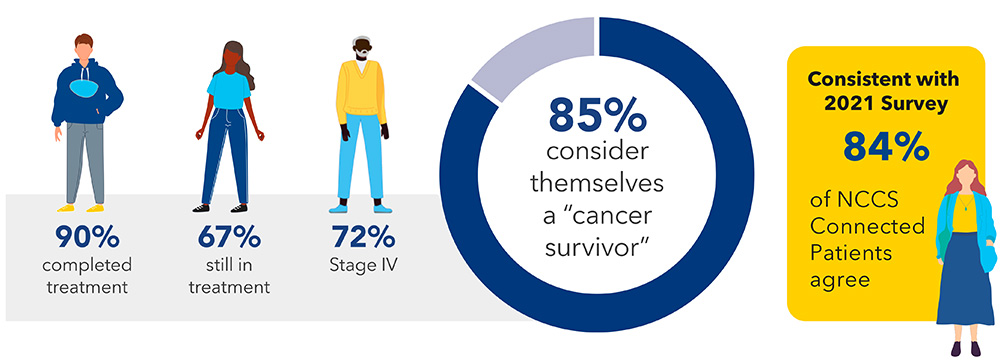
Cancer Care Experiences
NCCS asked patients and caregivers several questions in this year’s survey to better understand their experiences throughout the continuum of care.
This year, 80% of patients, 87% of caregivers, and 59% of NCCS-connected individuals reported receiving a care plan from their health care team that helped them understand what to expect. Patients currently in treatment are more likely to say their health care team provided a care plan, while those who completed treatment are more likely to say they did not or are unsure. Further exploration for next year’s survey will be to understand the nature of the care plan, whether it was oral or in writing, and how detailed it was.
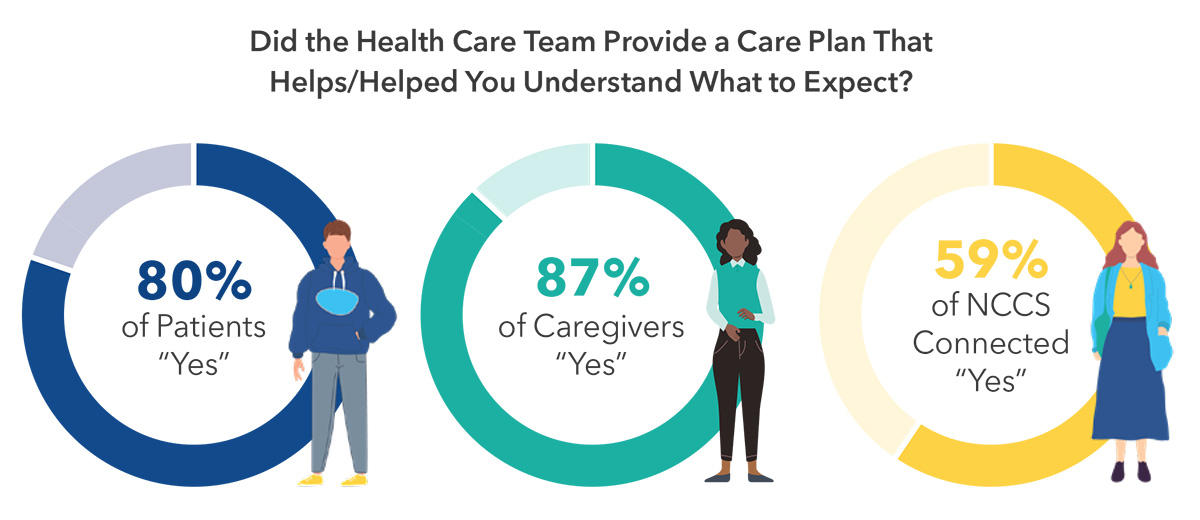
Most patients remain very satisfied with each stage of their care, and satisfaction has increased this year on several dimensions. Most patients with Stage IV cancer (56%) who were asked about their satisfaction with end-of-life planning and care were unable to comment, which may indicate that they have not had these conversations as part of their care. Ninety percent (90%) of caregivers said they attended all or most appointments with their loved ones. They were significantly less satisfied and more critical of the care their loved one received. Caregivers’ satisfaction with care is at least 10 points lower at nearly every phase of the cancer journey. However, both caregiver and patient satisfaction is higher among those who received a care plan.
Consistent with previous years, patients largely report positive experiences with their health care team, but certain groups report less satisfaction with their care. Eighty-two percent (82%) of patients say they completely trust their health care team to act in their best interest. However, this is lower among Black (74%) and Hispanic (73%) patients. Further, 69% of patients say they felt their health care provider always listened and respected their questions and concerns, but only 51% of young adults agree. At the same time, only 63% of caregivers trusted their health care team to act in their loved one’s best interest, while just 53% felt the health care provider always listened and respected their or their loved one’s questions and concerns.
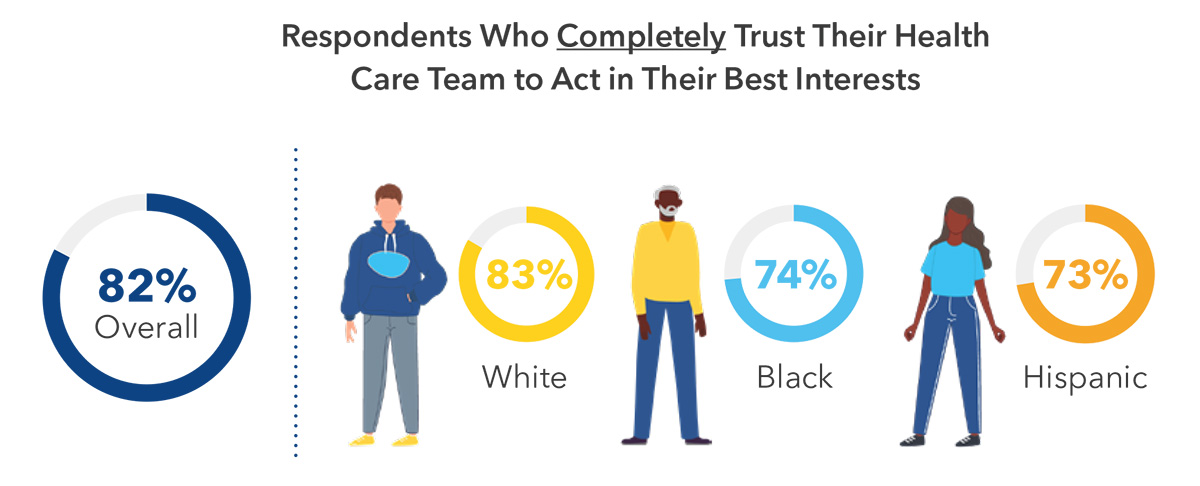
In this year’s survey, 90% of patients say they experienced at least one symptom during treatment. As in previous years, feeling overly tired and mental health concerns are still the primary symptoms experienced, both of which increased since last year. Women, Black and Hispanic patients, and young adults are more likely to experience a variety of symptoms, with six-in-ten young adults reporting mental health issues. Patients who have completed treatment are most likely to report still experiencing sexual concerns, fatigue, mental health issues, and neuropathy. LGBTQ patients are significantly more likely to say they still experience mental health issues (34% compared to 18% overall).
Most patients and caregivers say they felt very informed about side effects from treatment, compared to only 44% of NCCS-connected individuals. However, less than half of patients say their health care team was very helpful in addressing some of the most common side effects. Specifically, patients report that their health care teams were less helpful in addressing memory loss and cognitive issues, insomnia or sleeplessness, and sexual concerns. Patients who received a care plan felt more informed and that their care team was helpful.
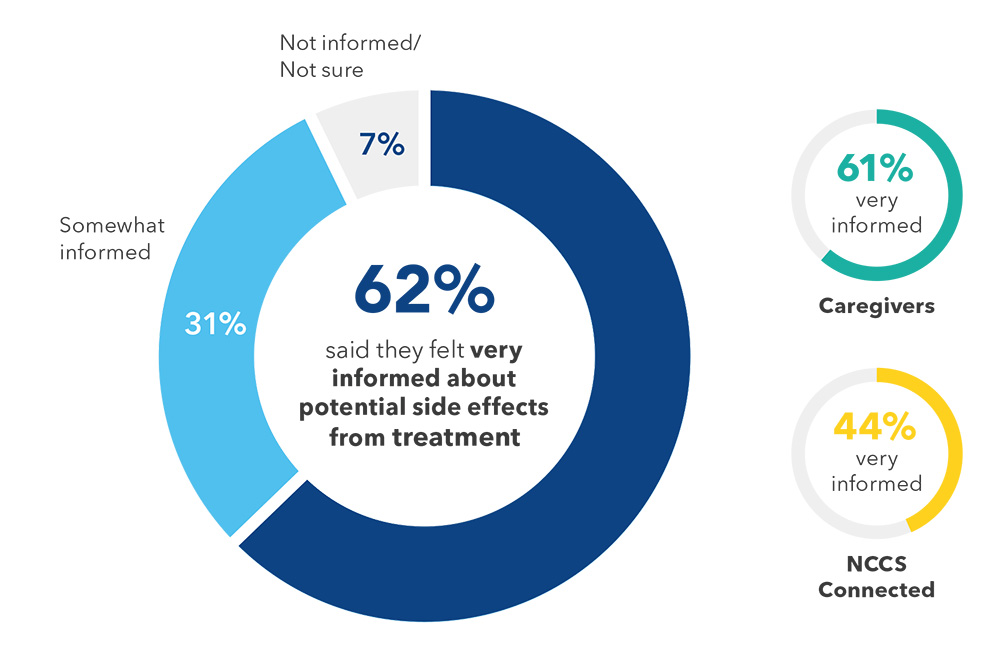
During the post-treatment stage, 44% of patients report seeing their oncologist for follow-up care, compared to 30% of patients who see their primary care physician. During these visits, patients primarily discuss follow-up tests to monitor their cancer with their health care provider. Far fewer discuss other issues, nor do they express interest in doing so. Patients who continue to see their oncologist during post-treatment care are more likely to discuss follow-up tests, quality of life, support groups, and a survivorship care plan than those who see their primary care provider.
Patients also express experiencing financial impacts because of their cancer. The number of patients impacted financially decreased nationally to 43% (compared to 47% in 2022), but young, Black, Hispanic, and NCCS-connected patients, as well as patients with Stage IV cancer, continue to report more financial hardship. Caregivers also have higher rates of financial consequences. Overall, patients were more likely to say that they had to spend savings or retirement money to cover living expenses, apply for government financial assistance, or borrow money from family or friends.
Read more detailed data about experiences in cancer care in the full 2023 report. Download it Here »
Working With Cancer
This year’s survey included new questions about survivor and caregiver employment challenges after a cancer diagnosis.
Nearly half of patients report working during cancer treatment, while one-third were retired, and one-in-ten received disability. Further, two-thirds of caregivers say they worked during their loved one’s treatment. Overall, 70% of patients and 83% of caregivers say their cancer diagnosis or their loved one’s diagnosis impacted their work. The most common work impacts reported are missing work, working fewer hours, and lost salary or wages. Patients say they missed an average of 18 work hours during a typical week, while caregivers missed 15.
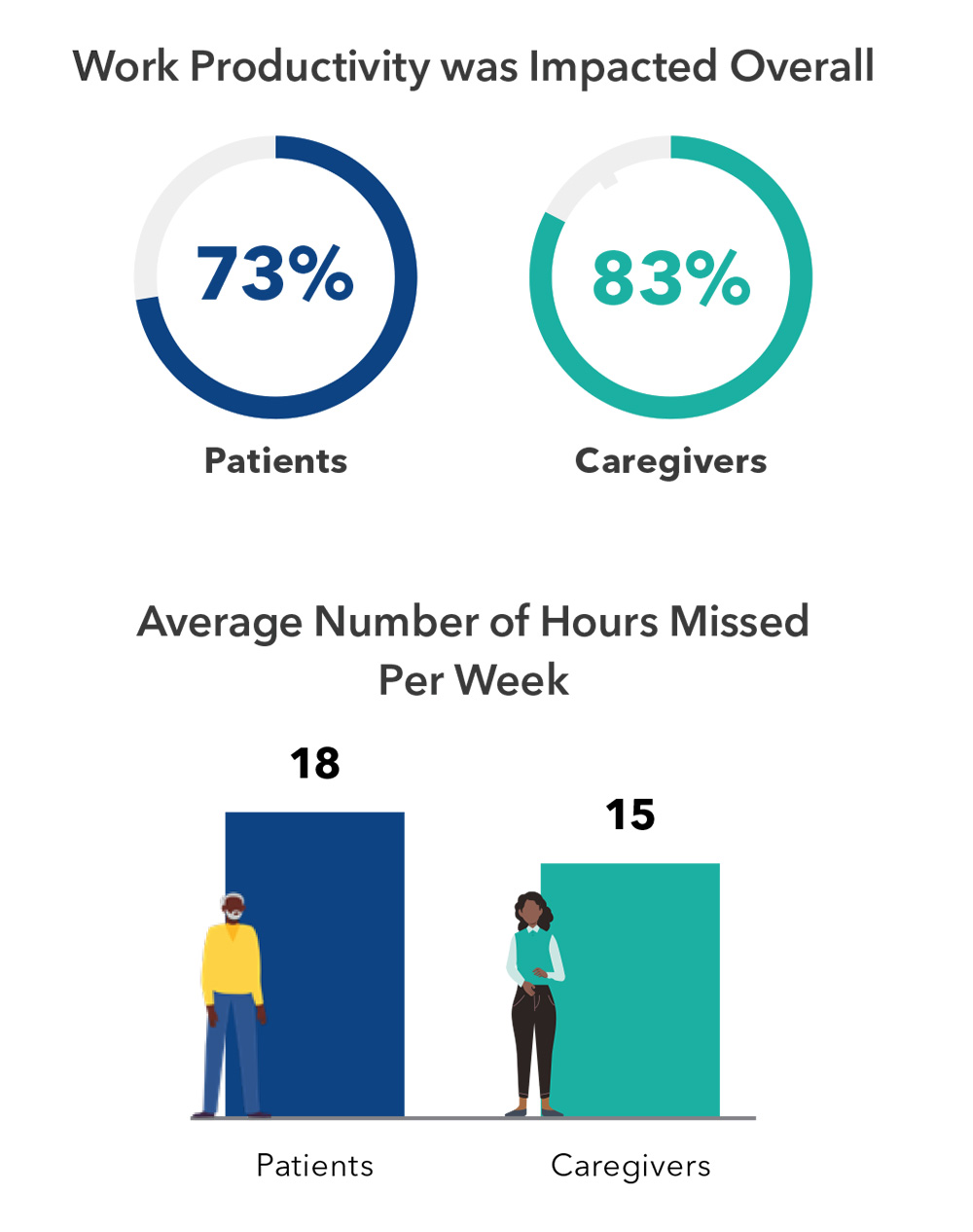 Additionally, most patients and caregivers report that their work productivity was impacted, with caregivers reporting more significant impacts.
Additionally, most patients and caregivers report that their work productivity was impacted, with caregivers reporting more significant impacts.
Of the survey respondents, 73% of patients say their cancer diagnosis impacted their work productivity, and 83% of caregivers agreed. Individuals with Stage I cancer, those who underwent surgery only, and survivors who received no chemotherapy or radiation are more likely to report no impact on their work productivity. Caregivers of Stage III and Stage IV patients, however, are more likely to say that cancer completely prevented them from working.
Patients and caregivers report both positive and negative impacts on their work experience. Most caregivers report being stressed (62%) and distracted at work (52%), compared to four-in-ten patients who feel the same. However, the percentage is substantially higher among patients with Stage IV cancer (67%) who continued to work during cancer treatment. Conversely, many patients and caregivers report that their work colleagues showed understanding and that work helped them stay motivated and keep their mind off cancer. Stage I patients are likelier to say they had the energy to focus and finish their work.
Read more detailed data about working with cancer in the full 2023 report. Download it Here »
Integrative Oncology
Six-in-ten patients report receiving integrative services during their cancer care, and they rate prayer and spiritual practices, movement or exercise, and mindfulness as most effective.
Use of these services is highest among women and young adults (18-39), as well as NCCS-connected, Black, and Hispanic individuals.
General wellbeing and coping with cancer’s emotional or mental impact are the primary reasons for using integrative care services among survey participants. Many patients, however, say they were unaware that these therapies existed (31%) or that their health insurance did not cover them (12%), which served as barriers to receiving this care.
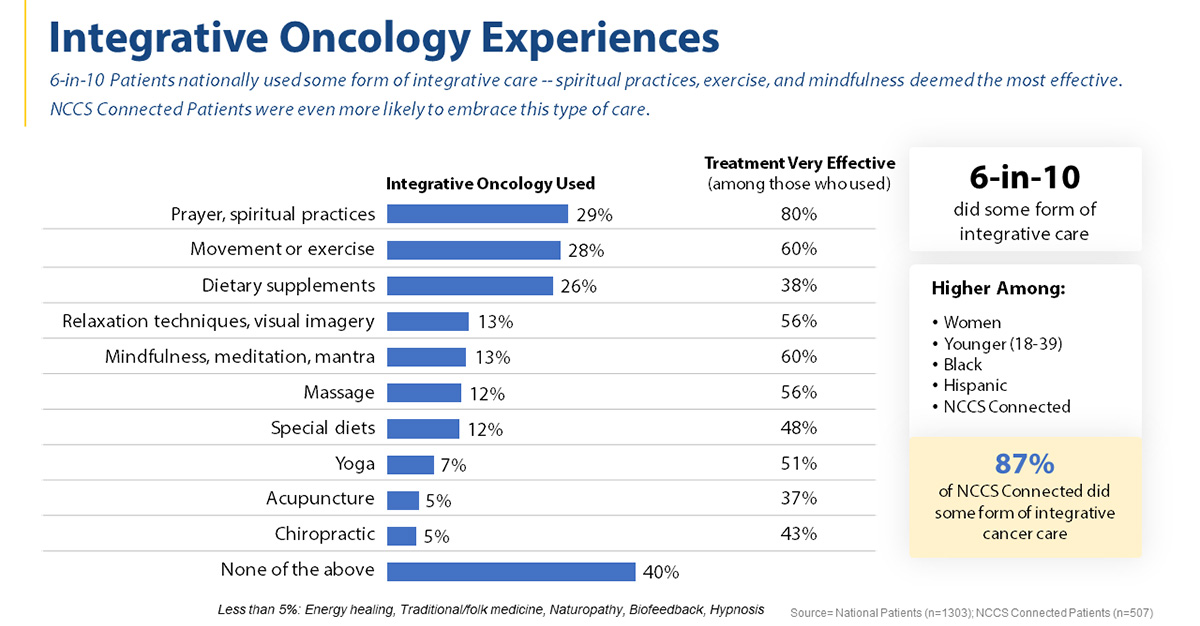
Read more detailed data about patients’ experiences with integrative oncology in the full 2023 report. Download it Here »
Conclusion
Our 2023 State of Survivorship Survey provided an invaluable opportunity to explore the cancer survivorship journey from a range of perspectives and better understand how NCCS can support our mission to advocate for quality care for everyone touched by cancer.
This year, we were able to:
| Build upon and track our findings from 2022. | |
| Understand cancer survivors’ mindset and cancer experiences. | |
| Explore how caregivers align with and differ from patients in terms of decision-making and satisfaction with cancer care. | |
| Learn more about survivor and caregiver employment challenges after a cancer diagnosis. | |
| Understand cancer survivors’ reasons for and barriers to using integrative oncology care services. |
The data showed:
| Patients rely on their doctor to decide on treatment options and are focused on getting rid of the cancer, no matter what, while caregivers are more likely to be involved in treatment decision-making and to prioritize quality of life. | |
| Patients largely feel informed about potential side effects from treatment but say their health care team is unhelpful in addressing many of the most commonly reported side effects. | |
| Patient satisfaction remains high at each stage of cancer care, but caregivers are less satisfied and more critical of the care received. | |
| A cancer diagnosis significantly impacts patients’ and caregivers’ work, resulting in missed work, fewer hours worked, and lost salary or wages. | |
| Caregivers experience a number of physical, emotional, and mental health issues related to their loved one’s cancer and many do not receive the support they need. | |
| Respondents who are connected to NCCS consistently have higher expectations in their assessments of quality care and are more likely to feel empowered to be active in their care. | |
| Most patients with Stage IV cancer who were asked about their satisfaction with end-of-life planning and care were unable to comment, which may indicate that these conversations are not addressed as part of their care. |
The results of this year’s survey demonstrate the importance of continuing our efforts to fulfill our mission. It is therefore critical that we continue to:
- Advocate for change in how the nation researches, regulates, finances, and delivers quality cancer care and work to pass the Comprehensive Cancer Survivorship Act and Cancer Care Planning and Communications Act.
- Empower cancer survivors and patient advocates through our publications, tools for self-advocacy, and programs, including the Survivorship Checklist, the Cancer Policy & Advocacy Team (CPAT), and Elevating Survivorship.
- Convene advocates and cancer organizations to address nationwide public policy issues affecting cancer survivors.
NCCS represents more than 18 million Americans who share the survivorship experience—living with, through, and beyond a cancer diagnosis. Our 2023 State of Survivorship Survey shows us where there are gaps in care and support, resulting in unequal outcomes for cancer survivors. Our work has never been more urgent.
See More Tables, Charts, and Data
The State of Survivorship Survey report and detailed findings presentation deck contain much more information, including data on additional topics and more detailed tables and charts. Download the Detailed Slide Deck Here »
Download the Full Report Here »
Request Survey Data
The National Coalition for Cancer Survivorship (NCCS) accepts requests from researchers and advocacy organizations wanting to use the State of Survivorship data set to support their research and practice for the purpose of improving quality of care for those touched by cancer.
Program Supporters
